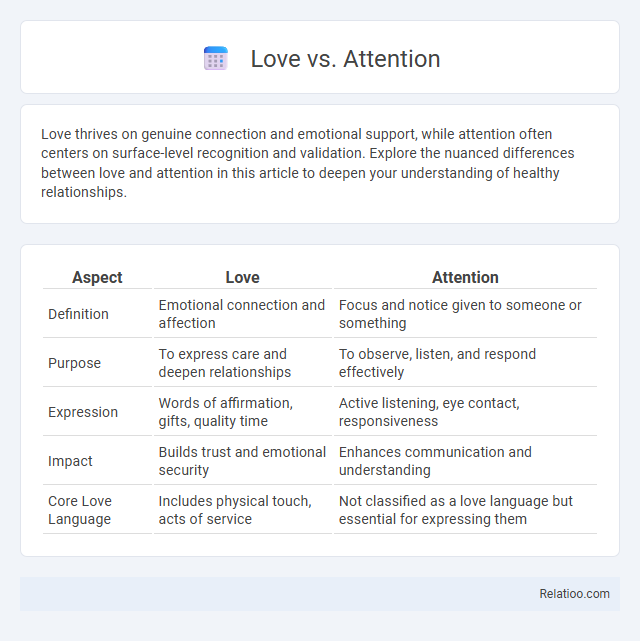Love thrives on genuine connection and emotional support, while attention often centers on surface-level recognition and validation. Explore the nuanced differences between love and attention in this article to deepen your understanding of healthy relationships.
Table of Comparison
| Aspect | Love | Attention |
|---|---|---|
| Definition | Emotional connection and affection | Focus and notice given to someone or something |
| Purpose | To express care and deepen relationships | To observe, listen, and respond effectively |
| Expression | Words of affirmation, gifts, quality time | Active listening, eye contact, responsiveness |
| Impact | Builds trust and emotional security | Enhances communication and understanding |
| Core Love Language | Includes physical touch, acts of service | Not classified as a love language but essential for expressing them |
Understanding Love and Attention: Key Differences
Love is an emotional connection characterized by deep care and commitment, whereas attention involves focusing on someone's presence or needs without necessarily implying emotional attachment. Understanding love requires recognizing genuine concern and selflessness, while attention may be temporary and superficial, influenced by your motives or desires. Your ability to discern these differences helps foster authentic relationships based on sincere affection rather than mere curiosity or intent.
The Psychology Behind Love and Attention
Love and attention are intertwined psychological needs, with love often driving deeper emotional bonds while attention fulfills the human desire for recognition and validation. The underlying motive behind seeking love typically stems from an intrinsic need for connection and belonging, whereas attention can sometimes be sought to boost self-esteem or affirm one's identity. Psychological studies reveal that balanced love and attention contribute to emotional well-being and secure attachment, whereas imbalances may lead to dependency or emotional distress.
Signs You’re Seeking Attention, Not Love
Seeking attention often manifests through exaggerated emotions, frequent need for validation, and inconsistent behavior toward others, signaling a desire for recognition rather than genuine connection. Your focus on superficial approval may mask deeper emotional needs, where actions are motivated by the urge to be noticed instead of authentic affection. Recognizing these signs helps differentiate true love, which involves empathy and commitment, from attention-seeking motives driven by insecurity or loneliness.
How Genuine Love Manifests in Relationships
Genuine love manifests in relationships through consistent actions that prioritize Your partner's well-being without expecting anything in return, distinguishing it from fleeting attention or self-serving motives. It embodies empathy, trust, and emotional support that nurture growth and deepen connection over time. Unlike temporary attention or hidden motives, authentic love fosters mutual respect and unconditional commitment.
Emotional Needs: Love Versus Attention
Understanding the differences between love, attention, and motive is crucial for meeting your emotional needs effectively. Love provides a deep sense of connection and unconditional support, while attention often satisfies the desire to feel acknowledged and valued in the moment. Recognizing these distinctions helps you nurture genuine relationships based on emotional fulfillment rather than superficial validation.
The Impact of Social Media on Love and Attention
Social media platforms reshape how love and attention manifest by amplifying visibility and validation, often leading to superficial engagement rather than genuine emotional connection. Your emotional well-being can be influenced by curated online interactions that prioritize attention over authentic motives, causing confusion between real affection and performative behavior. Understanding this dynamic is crucial to fostering sincere relationships amid the digital noise of likes, shares, and comments.
Love vs Attention: Effects on Self-Esteem
Love nurtures genuine self-esteem by affirming Your intrinsic worth and fostering emotional security, while attention often provides temporary validation that can fluctuate and undermine lasting confidence. Genuine love promotes acceptance and unconditional support, whereas attention can shift based on external factors, leading to dependency and self-doubt. Understanding this distinction helps reinforce a stable sense of self-worth that is not solely reliant on external approval.
Navigating Relationships: Choosing Love Over Attention
Navigating relationships requires understanding the difference between love, attention, and motive to foster genuine connections. You should prioritize love, which is rooted in care and respect, rather than seeking attention that often leads to superficial bonds or motives driven by personal gain. Choosing love creates lasting emotional intimacy and builds trust essential for a healthy relationship.
Recognizing Unhealthy Patterns: Attention-Seeking vs True Connection
Recognizing unhealthy patterns between love, attention, and motive is essential for nurturing genuine relationships. Attention-seeking behavior often masks insecurity and can undermine true connection, causing emotional imbalance. Your awareness of these distinctions helps foster authentic bonds built on mutual respect and sincere affection rather than superficial validation.
Building Fulfilling Relationships: Focusing on Real Love
Real love forms the foundation of fulfilling relationships by fostering genuine emotional connection and mutual respect. Attention without love remains superficial, often driven by personal motives rather than sincere care, which can undermine trust and intimacy. You can build lasting bonds by prioritizing authentic love over fleeting attention and self-serving motives, ensuring deeper understanding and commitment.

Infographic: Love vs Attention
 relatioo.com
relatioo.com